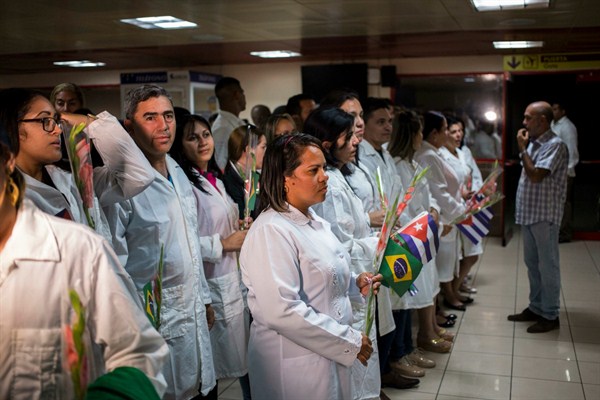The government of Cuba canceled a medical cooperation agreement with Brazil and withdrew thousands of its doctors from the country late last year after Brazil’s new president, Jair Bolsonaro, criticized the Cuban government for taking most of the doctors’ salaries and not allowing their families to accompany them to Brazil. The exodus of Cuban doctors is expected to severely impair health care services for millions of poor Brazilians who depended on them. In an email interview with WPR, Albert Ko, a professor of epidemiology at the Yale School of Public Health who has conducted research in Brazil, discusses the withdrawal’s other likely implications, both for Cuba’s medical diplomacy initiatives and for Brazil’s marginalized communities.
World Politics Review: For how long have Cuban medical professionals been working in Brazil, and how much damage does the termination of this program do to Havana’s medical diplomacy?
Albert Ko: Brazil and Cuba have had agreements since the early 2000s, established during the presidency of Luiz Inacio Lula da Silva, to bring thousands of Cuban medical professionals to Brazil to provide health care for mostly rural and underserved populations. These agreements were incorporated into the Mais Medicos, or More Doctors, program when it was launched in 2013 under President Dilma Rousseff, with the goal of remedying a shortage of health care professionals in remote parts of the country. Until last November, Cuban doctors accounted for more than 8,000 of the 18,000 physicians in the program and, as part of Brazil’s universal health care system, provided basic medical services for 30 million people living in the most impoverished and marginalized regions.
The termination of the agreement with Brazil will have a major impact on Cuba’s policy of medical diplomacy, since Cuban doctors in Brazil represented a significant proportion of the 50,000 physicians that serve abroad. Cuba will lose annual revenues of roughly $300 million for their participation in Mais Medicos, which in part subsidizes medical diplomacy in less affluent countries in the Americas and Africa. Furthermore, the agreement had significant political value given the pre-eminence of Brazil as a partner in the region, while also promoting the principle of universal health care, which is shared by both countries. The end of their participation is a major setback for a core diplomatic initiative for the Cuban government.
WPR: What impact is this move likely to have on the quality and reach of health services in poor and remote areas of Brazil?
Ko: It is unclear at the moment what the impact of the Cuban withdrawal will be, but it is likely to be significant given that Cuban physicians were often the only health care providers for the most vulnerable segments of the Brazilian population. Physicians in the Mais Medicos program provide primary health care for approximately 60 million Brazilians, which includes key medical services such as prenatal care and treatment of hypertension and diabetes. In addition, they play a key role in implementing preventative public health programs such as childhood immunization. Cuban physicians were the sole health care providers in more than 1,500 municipalities, most of which were situated in rural locations with overall poor access to specialized medical services.
These doctors were therefore the only providers of emergency medical, obstetrical and surgical care for populations residing in these regions. Furthermore, Cuban physicians provided basic medical services for more than 75 percent of Brazil’s indigenous population, which has traditionally had the worst health outcomes among all segments of the Brazilian population. Although it remains to be seen how much of the void created by the withdrawal of Cuban physicians will be filled, it seems likely that the immediate health impacts will be negative. Therefore, efforts are needed to monitor for such impacts in affected communities and implement effective responses.
WPR: Why is the Brazilian government having so much difficulty filling the vacancies? To what extent will this issue pose a challenge to President Bolsonaro?
Ko: Inequity in access to health care services and ensuring universal health care are long-standing issues in Brazil, as they are in many countries, including the United States. Despite having made significant efforts to increase the health care workforce, Brazil has not succeeded in closing this equity gap. This is in part due to the economic and social incentives for professionals to reside in urban centers, serve wealthier populations and receive remuneration from private health plans. The size of the country and degree of marginalization experienced by poor, rural-based communities are additional factors. The need to address these challenges has been the foundation for the Mais Medicos program, as well as several comprehensive initiatives to strengthen the universal health care system made by the Lula and Rousseff administrations.
Although Cubans represented a significant proportion of the physicians in the program, Mais Medicos includes Brazilians who obtained their medical degree in Brazil and outside of the country, as well as doctors from several other countries. The government has made major efforts to fill the void by casting a wide net in publicizing recruitment for the program. It remains to be seen how successful these efforts will ultimately be, given the underlying economic and social drivers and budgetary constraints that have long hampered the program. My greatest fear is that the withdrawal of the Cuban physicians may be just one of many larger policy changes to come that will weaken the universal health care system, on which the majority of Brazilians depend and which has had a critical role in mitigating the harm caused by crippling levels of social inequality in the country.

